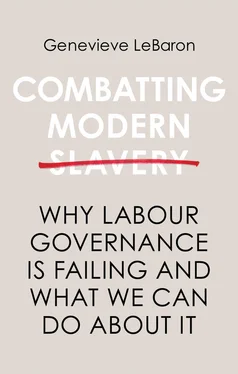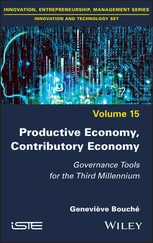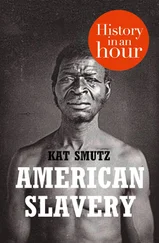Corporate power and the state
Understanding the changing nature and organization of corporations at the helm of global supply chains, and their deepening political power, is also essential to understanding why contemporary labour governance is failing to yield concrete improvements.
As corporations merge, monopolize and grow, they are exerting heightened control across broad global industrial sectors of production and consumption, and gaining even further power to dictate labour conditions within global supply chains. Further, changing patterns of financialization, corporate ownership and market speculation are introducing new and deeper pressures for corporations to produce profits for their shareholders. Under these circumstances, the value created within global supply chains is increasingly concentrated at the top, among investors and shareholders, and as profit.
At the same time, industry actors – including brand and retail firms, as well as big asset managers, big auditors and industry associations – are becoming increasingly proactive in initiating and shaping public regulations on supply chains, at the national and subnational levels, as well as in international conventions. In addition to longstanding lobbying activities, corporations are now seconding employees to national policy organizations, pioneering and funding civil society coalitions to stop slavery and human rights abuses by business, and integrating CSR initiatives into their long-term growth strategies. Yet, at the same time as they champion CSR initiatives to combat modern slavery and promote worker voice, industry actors are part of regulatory coalitions to fend off stronger labour laws and their enforcement. The result is that even the governance actors and initiatives we generally consider to be ‘public’ are often highly influenced by corporate power.
As I argue further in Chapter 3, the deepening political power of corporations is allowing them to leverage strategic control over supply chain governance initiatives, and especially those intended to bolster labour rights and reduce exploitation. It is staving off more radical reforms on corporate production activities, and it is undermining and co-opting civil society efforts to increase corporate liability and accountability for the worst forms of labour exploitation. It also troubles prevailing academic conceptualizations about the clean division between public and private, market and state, which has implications for solutions to these problems.
As part of the broad political economy dynamics outlined earlier in the book, a booming recruitment industry has emerged within global supply chains, posing major problems for the enforcement of global labour standards. A high and growing proportion of victims of labour exploitation – and especially victims of forced labour and human trafficking – are not part of companies’ core workforces. Rather, they are supplied through long and complex labour supply chains and employed by labour market intermediaries like agencies or brokers. Yet, recruiters and third-party agencies are very poorly regulated, and are inadequately covered (where included at all) in market-based labour governance initiatives. Indeed, as I will argue in Chapter 4, recent governance initiatives may even be fuelling exploitation by the recruitment industry as suppliers facing increased scrutiny by brands are turning to recruiters and labour agents as a strategy to outsource risk and cut costs.
A key part of the story of why labour governance is failing relates to this recruitment industry. In particular, it lies in the dynamics of labour supply chains, how recruiters and agents within them facilitate the transnational supply of vulnerable workers, and the role of the industry in anchoring labour exploitation within the global economy. Due to flaws in both design and implementation, contemporary efforts to govern labour standards have tended not to touch the recruitment industry, and, in doing so, have missed highly vulnerable and exploited workers.
Another set of industry actors that pose a crucial challenge to efforts to upgrade and improve working conditions worldwide is the enforcement industry. As mentioned, as part of the broader shift towards the privatization of supply chain governance, industry actors and NGOs have taken on roles as ‘monitors’ and ‘enforcers’ of labour standards in supply chains. But while private supply chain monitoring tools and programmes are highly profitable for accounting firms, NGOs and other industry actors involved in selling them, these seldom lead to concrete improvements for workers. Retail and brand companies leverage highly strategic control over the design and implementation of auditing programmes, including over new ‘beyond audit’ initiatives. As such, the ability of these programmes to detect and report exploitation and spur corrective action is limited. In the words of one UK audit firm employee, the majority of supply chain monitoring programmes ‘are not trying to find things out, they’re trying to prove that something is not there’. 62
As I will argue in Chapter 5, the enforcement industry is helping to conceal rather than solve the most urgent labour issues in supply chains. Taken as a whole, it is misrepresenting the nature of labour conditions and practices, not only doing little to help workers, but actively misleading consumers and policymakers about their plight. The enforcement industry is helping corporations to legitimize and grow their businesses, in part by generating media- and consumer-friendly metrics and reports that are helping to stave off pressure from civil society groups and reassure investors. But it is doing little to solve the urgent problem of labour exploitation in supply chains.
Corporate Fairytales vs. Worker Power
Understood in this way, industry-led labour governance initiatives are not simply neutral mechanisms that can be nudged towards effectiveness. It’s not enough to simply say that CSR efforts aren’t working. Too often, this insight then immediately leads to conversations about how existing programmes could be improved, overlooking major structural flaws such as the fact that most leave business models off the table for change, fail to confront corporate power and cannot overcome the reality that industry actors are lobbying to undermine the very causes they also promote through CSR. There is no doubt that it may be possible to make small improvements by tinkering around the edges of MSIs or ethical certification schemes. But this won’t correct the larger problem – that workers are largely unprotected and labour standards are dramatically underenforced in the contemporary global economy. Corporations may be undertaking efforts to improve and monitor labour standards in supply chains and fight problems like modern slavery. But by most measures, existing public and private initiatives are creating little concrete progress towards solving problems like forced labour, poverty wages, forced overtime and health and safety.
What should we make of the vast range of CSR initiatives to improve labour standards, and the compelling stories that companies tell us about these? In the conclusion of the book, I argue that we should understand corporate accounts of industry-led labour governance initiatives as fairytales. They are detailed, happy and compelling stories about magical mechanisms and events in faraway lands. But they are very unlikely to be true. And they are equally unlikely to become true in the future.
The longer that it takes for us to accept that, in spite of the undoubtedly good intentions of those involved in audit programmes, social benchmarks, ethical certification schemes and CSR programmes championed in corporate reports and company modern slavery statements are structurally flawed, the longer it will take to reclaim the regulatory space, power and tools that are necessary to promote credible and effective labour governance. The reality is that these corporate-led governance programmes are working just as they are intended: to improve corporate reputations, and to give us the impression that the problem of labour abuse in supply chains is slowly disappearing, so we don’t fight for alternatives that would challenge the status quo of highly profitable business models that rely on labour exploitation.
Читать дальше












